



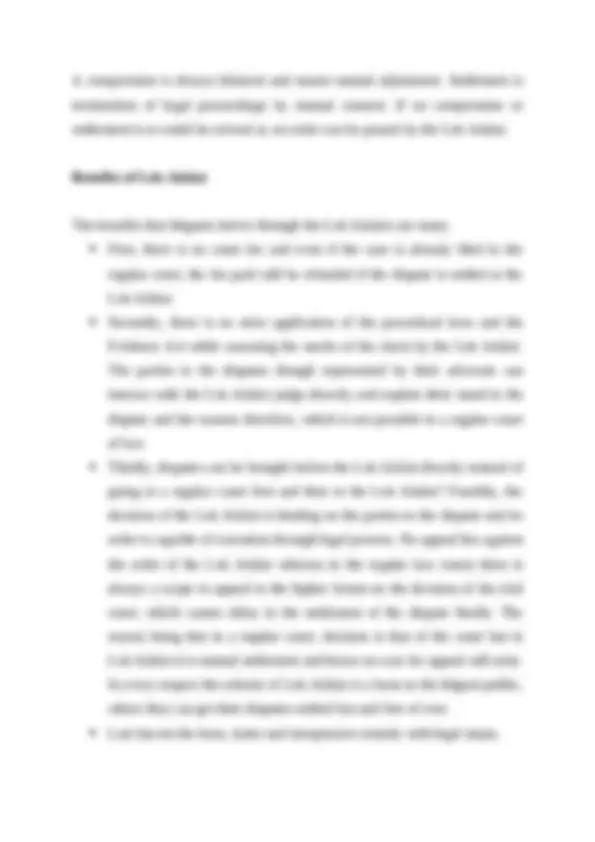
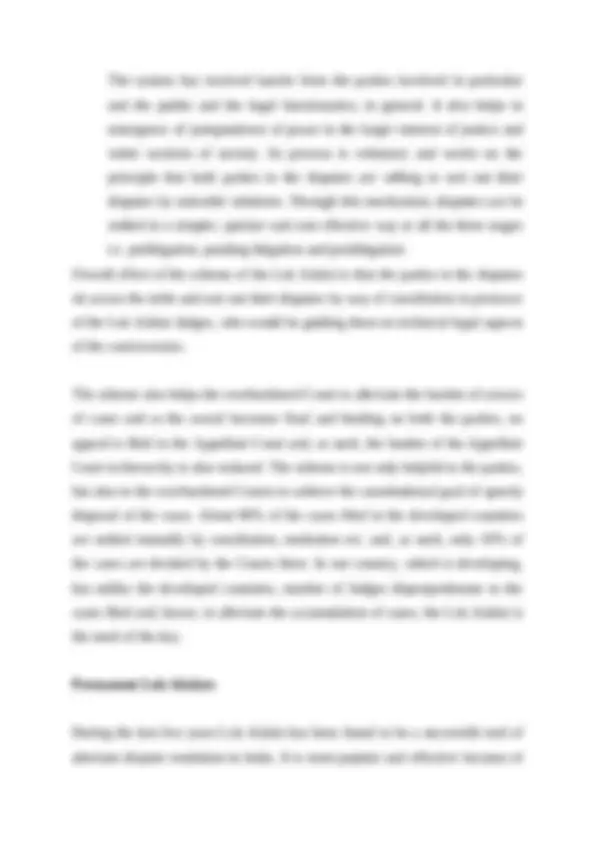

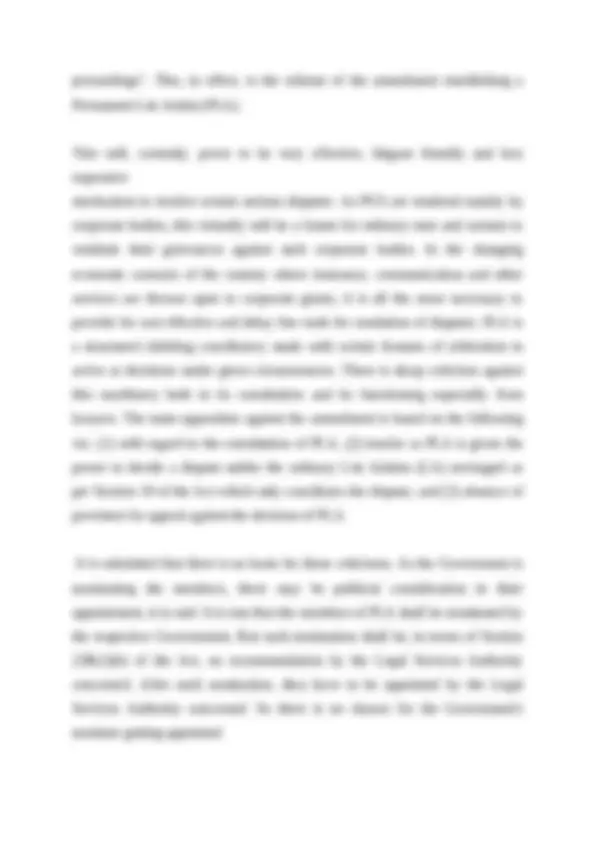

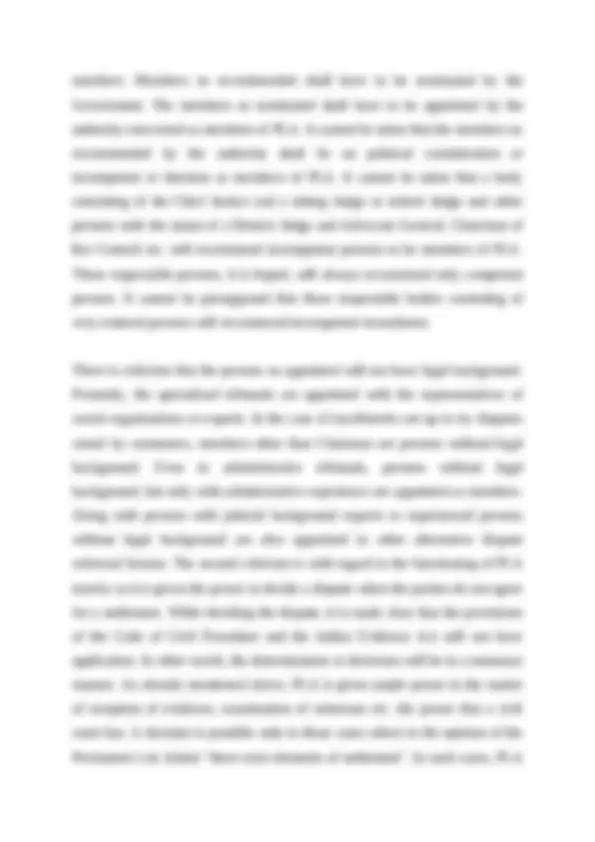

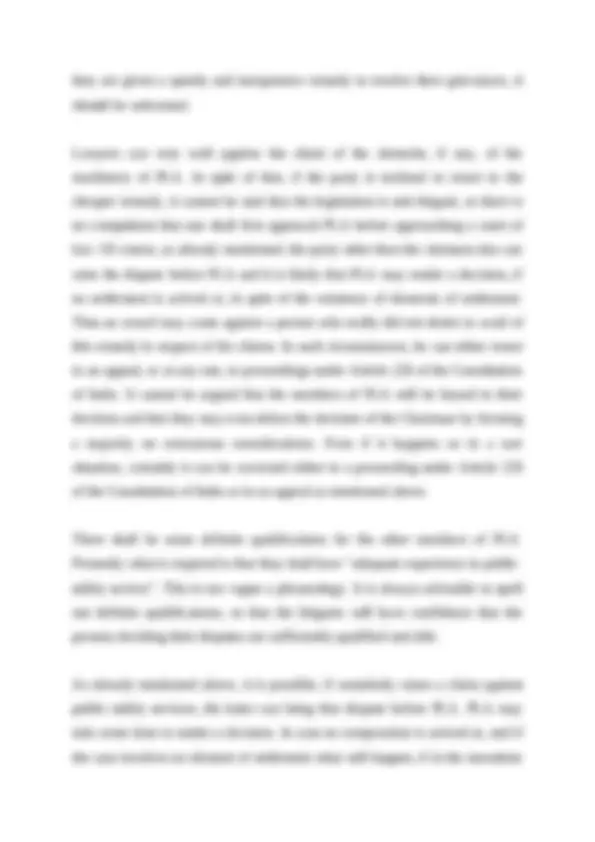



Study with the several resources on Docsity

Earn points by helping other students or get them with a premium plan


Prepare for your exams
Study with the several resources on Docsity

Earn points to download
Earn points by helping other students or get them with a premium plan
Community
Ask the community for help and clear up your study doubts
Discover the best universities in your country according to Docsity users
Free resources
Download our free guides on studying techniques, anxiety management strategies, and thesis advice from Docsity tutors
Any discussion on criminal justice system in India will remain incomplete without a reference to the institution of Lok Adalat. The phraseology ‘Lok Adalat’ comprises two words, namely, ‘Lok’ and ‘Adalat’ the former expressing the concept of public opinion while the latter denoting the accurate and thorough deliberation aspect of decision making.Both these aspects have been blended judiciously in the institution of Lok Adalat as envisaged by Sections 19(1) and 20(4) of the Legal Services Authori
Typology: Essays (university)
1 / 20

This page cannot be seen from the preview
Don't miss anything!













Any discussion on criminal justice system in India will remain incomplete without a reference to the institution of Lok Adalat. The phraseology ‘Lok Adalat’ comprises two words, namely, ‘Lok’ and ‘Adalat’ the former expressing the concept of public opinion while the latter denoting the accurate and thorough deliberation aspect of decision making. Both these aspects have been blended judiciously in the institution of Lok Adalat as envisaged by Sections 19(1) and 20(4) of the Legal Services Authorities Act, 1987. Judicial officers are integral part forming the composition of Lok Adalat and the principles of justice, equity and fair play are the guiding factors for decision based on compromises to be arrived at before such Adalats. The Lok Adalat is mainly concerned with two-fold functions. Firstly, it provides people a quick, easy, accessible, non-technical sympathetic and homely forum for resolution of their disputes and, secondly, it tackles the menace of what is known as ‘docket explosion’ i.e., piling number of pending cases which become unmanageable for the regular courts to handle effectively. The credit of originating this system for speedy justice to common man goes to Mr. Justice P. N. Bhagwati, the former Chief Justice of the Supreme Court of India who started Lok Adalats in the State of Gujarat during early seventies. This was followed by the States of Maharashtra, Kerala, Andhra Pradesh, Madhya Pradesh, Union Territory of Delhi, etc. which introduced Lok Adalats for urban and rural areas. These Adalats decide criminal, civil and revenue cases pending before the law courts by mutual consent of the parties. Without going into the procedural details of the working of Lok Adalat, suffice it to say that it has made
substantial contribution in taking justice to doors of common man and providing him speedy justice. On the criminal side, the offences compoundable under Section 320 (1) and (2) of the Code of Criminal Procedure 1973 are disposed of by the Lok Adalat through a compromise between the parties. Section 20(1) of the Legal Services Authorities Act, 1987 lays down that a Court of law where a case is pending may transfer the case to Lok Adalat for settlement when the parties to the case have made a joint application indicating their intention to compromise the matter. Thus, the section requires parties to apply before District Authority and not Lok Adalat. The parties to such a case shall be under no obligation to attend the court concerned during the period intervening between the filing of the joint application and disposal of the case by the Lok Adalat. However, the Legal Services Authorities Act, 1987, as amended by the Amending Act of 2002 now enables parties to file their case in Lok Adalat directly, if they so desire. In Madhya Pradesh, the first Lok Adalat was held at Bilaspur on April 13, 1986 and out of the total 797 cases disposed of by this Adalat as many as 226 were criminal cases. In all about one hundred and eighty three Lok Adalats have been organised in the State upto January 2006 each disposing of nearly 260 criminal cases on an average. It is thus evident that the institution of Lok Adalat is expected to play a crucial role in the administration of criminal justice in time to come. More recently, Lok Adalats are being arranged inside the prison institutions for providing undertrial prisoner’s access to speedy justice. This is indeed a step in the right direction which will help considerably in reducing the number of undertrial prisoners who are languishing in different jails for several years.
call it "Peoples' Court". It involves people who are directly or indirectly affected by dispute resolution. The salient features of this form of dispute resolution are participation, accommodation, fairness, expectation, voluntariness, neighbourliness, transparency, efficiency and lack of animosity. The concept of Lok Adalats was pushed back into oblivion in last few centuries before independence and particularly during the British regime. Now, this concept has, once again, been rejuvenated. It has, once again, become very popular and familiar amongst litigants. This is the system which has deep roots in Indian legal history and its close allegiance to the culture and perception of justice in Indian ethos. Experience has shown that it is one of the very efficient and important ADRs and most suited to the Indian environment, culture and societal interests. Camps of Lok Adalats were started initially in Gujarat in March 1982 and now it has been extended throughout the Country. The evolution of this movement was a part of the strategy to relieve heavy burden in the Courts with pending cases and to give relief to the litigants who were in a queue to get justice. The first Lok Adalat was held on March 14, 1982 at Junagarh in Gujarat the land of Mahatma Gandhi. Lok Adalats have been very successful in settlement of motor accident claim cases, matrimonial/family disputes, labour disputes, disputes relating to public services such as telephone, electricity, bank recovery cases and so on. Some statistics may give us a feeling of tremendous satisfaction and encouragement. Up to the middle of last year (2004), more than 200,000 Lok Adalats have been held and therein more than16 million cases have been settled,
half of which were motor accident claim cases. More than one billion US dollars were distributed by way of compensation to those who had suffered accidents. 6.7 million persons have benefited through legal aid and advice. The Statistics of the Gujarat State Legal Services Authority as to the number of cases disposed, the amount of compensation paid etc have been annexed herewith. Legislation pertaining to Lok Adalats The advent of Legal Services Authorities Act, 1987 gave a statutory status to Lok Adalats, pursuant to the constitutional mandate in Article 39A of the Constitution of India, contains various provisions for settlement of disputes through Lok Adalat. It is an Act to constitute legal services authorities to provide free and competent legal services to the weaker sections of the society to ensure that opportunities for securing justice are not denied to any citizen by reason of economic or other disabilities, and to organize Lok Adalats to secure that the operation of the legal system promotes justice on a basis of equal opportunity. Even before the enforcement of the Act, the concept of Lok Adalat has been getting wide acceptance as People's Courts as the very name signifies. Settlement of disputes at the hands of Panchayat Heads or tribal heads was in vogue since ancient times. When statutory recognition had been given to Lok Adalat, it was specifically provided that the award passed by the Lok Adalat formulating the terms of compromise will have the force of decree of a court which can be executed as a civil court decree. Procedure at Lok Adalat:
One issue which raises its head often is the finality of the award of the Lok Adalat. During the Lok Adalat, the parties agree to abide by the decision of the judge at the Lok Adalat. However, it is often seen that later, the same order is challenged on several grounds. In one of the recent decisions, the Supreme Court of India has once again laid to rest all such doubts. In unequivocal terms, the Court has held that award of the Lok Adalat is as good as the decree of a Court. The award of the Lok Adalat is fictionally deemed to be decrees of Court and therefore the courts have all the powers in relation thereto as it has in relation to a decree passed by itself. This, includes the powers to extend time in appropriate cases. The award passed by the Lok Adalat is the decision of the court itself though arrived at by the simpler method of conciliation instead of the process of arguments in court. Consent of Parties The most important factor to be considered while deciding the cases at the Lok Adalat is the consent of both the parties. It cannot be forced on any party that the matter has to be decided by the Lok Adalat. However, once the parties agree that the matter has to be decided by the Lok Adalat, then any party cannot walk away from the decision of the Lok Adalat. In several instances, the Supreme Court has held that if there was no consent the award of the Lok Adalat is not executable and also if the parties fail to agree to get the dispute resolved through Lok Adalat, the regular litigation process remains open for the contesting parties. The Supreme Court has also held that compromise implies some element of accommodation on each side. It is not apt to describe it as total surrender.
A compromise is always bilateral and means mutual adjustment. Settlement is termination of legal proceedings by mutual consent. If no compromise or settlement is or could be arrived at, no order can be passed by the Lok Adalat. Benefits of Lok Adalat The benefits that litigants derive through the Lok Adalats are many. First, there is no court fee and even if the case is already filed in the regular court, the fee paid will be refunded if the dispute is settled at the Lok Adalat. Secondly, there is no strict application of the procedural laws and the Evidence Act while assessing the merits of the claim by the Lok Adalat. The parties to the disputes though represented by their advocate can interact with the Lok Adalat judge directly and explain their stand in the dispute and the reasons therefore, which is not possible in a regular court of law. Thirdly, disputes can be brought before the Lok Adalat directly instead of going to a regular court first and then to the Lok Adalat? Fourthly, the decision of the Lok Adalat is binding on the parties to the dispute and its order is capable of execution through legal process. No appeal lies against the order of the Lok Adalat whereas in the regular law courts there is always a scope to appeal to the higher forum on the decision of the trial court, which causes delay in the settlement of the dispute finally. The reason being that in a regular court, decision is that of the court but in Lok Adalat it is mutual settlement and hence no case for appeal will arise. In every respect the scheme of Lok Adalat is a boon to the litigant public, where they can get their disputes settled fast and free of cost. Last but not the least, faster and inexpensive remedy with legal status.
its innovative nature and inexpensive style. The system received wide acceptance not only from the litigants, but from the public and legal functionaries in general. In India, during the last few years Lok Adalat has been functioning continuously and permanently in every district centre. In taluk centres also sittings of Lok Adalats have been held successfully. Several thousands of pending cases and disputes which had not reached law courts have been settled through Lok Adalats. The major defect of the mechanism of Lok Adalat is that it cannot take a decision, if one of the parties, is not willing for a settlement, though the case involves an element of settlement. The adamant attitude shown by one among the parties will render the entire process futile. Even if all the members of the Lok Adalat are of the opinion that the case is a fit one for settlement, under the present setup, they cannot take a decision unless all the parties consent. In his inaugural address at the second annual meet of the State Legal Services Authorities, 1999, the then Hon'ble Chief Justice Dr A.S. Anand airing him views stated thus: "There will be no harm if Legal Services Authorities Act is suitably amended to provide that in case, in a matter before it, the Judges of the Lok Adalats are satisfied that one of the parties is unreasonably opposing a reasonable settlement and has no valid defence whatsoever against the claim of the opposite party, they may pass an award on the basis of the materials before them without the consent of one or more parties. It may also be provided that against such awards, there would be one appeal to the court to which the appeal would have gone if the matter had been decided by a court.... This course, I think, would give relief to a very large number of litigants coming to Lok Adalats at pre-litigative stage as well as in pending matters."
In 2002, Parliament brought about certain amendments to the Legal Services Authorities Act, 1987. The said amendment introduced Chapter VIA with the caption PRE LITIGATION CONCILIATION AND SETTLEMENT. Section 22B envisages establishment of "PERMANENT LOK ADALATS (PLA)" at different places for considering the cases in respect of Public Utility Services (PUS). If there is a dispute with respect to PUS, as per Section 22C(1), any party to such a dispute can, before bringing it to a court of law for adjudication, make an application to PLA for the settlement of that dispute. The party making such application need not be a party who raises a claim against a public utility service. If a claim is made by one against a public utility service, the establishment carrying out the public utility service can also raise that dispute before PLA to resolve it. The only limitation is that PLA shall not have jurisdiction to consider a dispute relating to an offence not compoundable under any law or any matter where the value of the property in dispute exceeds Rs 10 lakhs. But the Central Government can, by an appropriate notification, increase this limit. Once an application has been made to PLA by one party, no party to that application shall invoke the jurisdiction of any court in the same dispute. PLA has to be established by the National Legal Services Authority or the State Legal Services Authorities. It shall have three members; the Chairman, who is or has been a District Judge or an Additional District Judge or has held a judicial office higher in rank than that of a District Judge and two other members having adequate experience in public utility service. Such persons shall be appointed by the State or the Central Authority, as the case may be, upon nomination by the respective Governments. But at the same time, such nomination shall be on the recommendation of the Central or the State Authority. Section 22C(3) provides that when an application is filed raising a
proceedings". This, in effect, is the scheme of the amendment establishing a Permanent Lok Adalat (PLA). This will, certainly, prove to be very effective, litigant friendly and less expensive mechanism to resolve certain serious disputes. As PUS are rendered mainly by corporate bodies, this virtually will be a forum for ordinary men and women to ventilate their grievances against such corporate bodies. In the changing economic scenario of the country where insurance, communication and other services are thrown open to corporate giants, it is all the more necessary to provide for cost effective and delay free tools for resolution of disputes. PLA is a structured clubbing conciliatory mode with certain features of arbitration to arrive at decisions under given circumstances. There is sharp criticism against this machinery both in its constitution and its functioning especially from lawyers. The main opposition against the amendment is based on the following viz. (1) with regard to the constitution of PLA; (2) insofar as PLA is given the power to decide a dispute unlike the ordinary Lok Adalats (LA) envisaged as per Section 19 of the Act which only conciliates the dispute; and (3) absence of provision for appeal against the decision of PLA. It is submitted that there is no basis for these criticisms. As the Government is nominating the members, there may be political consideration in their appointment, it is said. It is true that the members of PLA shall be nominated by the respective Governments. But such nomination shall be, in terms of Section 22B(2)(b) of the Act, on recommendation by the Legal Services Authority concerned. After such nomination, they have to be appointed by the Legal Services Authority concerned. So there is no chance for the Government's nominee getting appointed.
There is a Central Authority called the "National Legal Services Authority". Its patron is the Hon'ble Chief Justice of India. Its Executive Chairman is the senior most Judge of the Supreme Court of India. Two among the members are two Chairmen of the State Legal Services Authorities who are invariably sitting Judges of the High Courts concerned. Another member is the Secretary of the Department of Legal Affairs and there is a Member Secretary who is a District Judge. Apart from that, there are members like the Secretary, Department of Expenditure, and members appointed by the Government in consultation with the Chief Justice of India. Those persons shall be eminent persons in the field of law or persons of repute in the legal services schemes or eminent social workers. So far as the State Legal Services Authorities are concerned, it is headed by a Patron in Chief who is none other than the Hon'ble Chief Justice of the High Court. In almost all the State Authorities, except perhaps one or two, a sitting Judge of the High Court functions as the Executive Chairman. A District Judge functions as the Member Secretary. So far as Kerala is concerned, the other members are the Registrar of the High Court, the Advocate General, the Director General of Prosecutions, the Chairman of the Bar Council of Kerala, President of the Kerala High Court Advocates' Association, the Law Secretary, the Finance Secretary, Director of Health Services, Director General of Police, Chairman, Kerala State Women's Commission and persons having special knowledge and practical experience in social service etc. Other State Authorities also have similar constitution. It is these authorities with such eminent personalities which shall recommend the names of the members of PLA. It is a body consisting of the Chief Justice of the High Court and a sitting Judge who is the Executive Chairman of the State Authority, which consists of eminent persons in the legal field that recommends such
formulates the terms of a possible settlement and gives such terms to the parties concerned for their observations. These observations will be considered on the basis of evidence produced by the parties. If they do not come to a settlement, PLA shall decide the dispute. That means, PLA is not given the power to decide every dispute coming before it. Only those disputes where there exist elements of settlement can be decided by the Permanent Lok Adalat. The decision or the opinion of the Permanent Lok Adalat as to whether there exist elements of settlement is also a matter which can be subjected to judicial review under Article 226 of the Constitution of India. Therefore, there shall be a check in that respect as well. It is further ensured in the Act that while deciding the dispute on merit, PLA shall be guided by the "principles of natural justice, objectivity, fair play, equity and other principles of justice". Thus, a fair procedure is always envisaged. Therefore, there is no reason for any criticism on the power granted to PLA to decide the dispute in the event of a settlement not being arrived at despite the existence of an element of settlement. It cannot be said that there is no appeal against the decision of PLA. So far as the ordinary Lok Adalats (LA) are concerned which is in existence even prior to the amendment and is still being continued no appeal will lie against an award of that Lok Adalat. The ordinary LA adopts only a conciliatory method and does not decide a dispute. Therefore, disputes are settled on consent of the parties. When a dispute is settled based on consent, no appeal need lie from any such order or award even if there is a settlement in court. Under the civil procedure law also no appeal shall lie from a decree passed on consent of the parties. This is the reason the Act declares that "no appeal shall lie to any court against the award" of ordinary Lok Adalat (LA) envisaged in Chapter VI of the
Act. But the award of Permanent Lok Adalat (PLA) envisaged in the newly introduced Chapter VIA is different. If it is an award upon consent of parties and is as a result of compromise, necessarily, nobody will think of an appeal. When there is a decision by PLA, as the parties did not agree for a compromise, it is possible that the aggrieved party may think of an appeal. Every award of the Permanent Lok Adalat, whether it is based on consent of the parties, or on compromise or upon the decision, "shall be deemed to be a decree of a civil court". Thus the decision taken by PLA will have all the attributes of a decree of a civil court. It will be taken and considered in all respects, as a decree of a civil court. Every decree, unless it is appealed against and so long as it is allowed to continue, will be final and binding on the parties. Same is the case of an award of PLA. It is true that there is no provision for appeal. But appeal is not expressly excluded, in the case of award of PLAs. It is not stated anywhere in the Act that an award of a PLA shall not be called in question in any appeal, as is done in the case of the award of an ordinary Lok Adalat (LA) in Section 21(2) of the Act. Certainly, appeal will lie only if it is provided somewhere by law. Otherwise, one cannot file an appeal. It seems that the provision of Section 96(1) CPC could be relied on to establish that an appeal is not excluded. As already mentioned above, the award of PLA has all the attributes of a civil court decree and it is deemed as a decree of a civil court. Section 96(1) of the Code of Civil Procedure, 1908 provides: Save where otherwise expressly provided in the body of this Code or by any other law for the time being in force, an appeal shall lie from every decree passed by any court exercising original jurisdiction to the court authorized to hear appeals from the decisions of such court." When the award of PLA is treated as a decree of civil court and as it is not otherwise provided in the Legal
they are given a speedy and inexpensive remedy to resolve their grievances, it should be welcomed. Lawyers can very well apprise the client of the demerits, if any, of the machinery of PLA. In spite of that, if the party is inclined to resort to the cheaper remedy, it cannot be said that the legislation is anti litigant, as there is no compulsion that one shall first approach PLA before approaching a court of law. Of course, as already mentioned, the party other than the claimant also can raise the dispute before PLA and it is likely that PLA may render a decision, if no settlement is arrived at, in spite of the existence of elements of settlement. Thus an award may come against a person who really did not desire to avail of this remedy in respect of his claims. In such circumstances, he can either resort to an appeal, or at any rate, to proceedings under Article 226 of the Constitution of India. It cannot be argued that the members of PLA will be biased in their decision and that they may even defeat the decision of the Chairman by forming a majority on extraneous considerations. Even if it happens so in a rare situation, certainly it can be corrected either in a proceeding under Article 226 of the Constitution of India or in an appeal as mentioned above. There shall be some definite qualifications for the other members of PLA. Presently what is required is that they shall have "adequate experience in public utility service". This is too vague a phraseology. It is always advisable to spell out definite qualifications, so that the litigants will have confidence that the persons deciding their disputes are sufficiently qualified and able. As already mentioned above, it is possible, if somebody raises a claim against public utility services, the latter can bring that dispute before PLA. PLA may take some time to render a decision. In case no compromise is arrived at, and if the case involves no element of settlement what will happen, if in the meantime
the period of limitation is over, so far as the claimant party is concerned Can it be taken that he has been "prosecuting with due diligence in civil proceedings" in a court Because, so far as PLA is concerned, he was not the party initiating the dispute. The Lok Adalat is not treated as a court, but only vested with certain powers of a civil court or shall be deemed to be a civil court for the purpose of Section 195 and Chapter XXVI of the Code of Criminal Procedure,